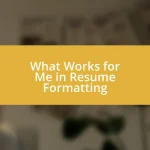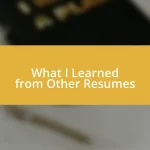Key takeaways:
- Tailoring your resume for each job application significantly enhances your chances of securing an interview.
- Incorporating action verbs transforms job responsibilities into impactful accomplishments, showcasing your contributions more effectively.
- Seeking and embracing feedback from workshops or peers can provide valuable insights that improve your resume’s clarity and effectiveness.
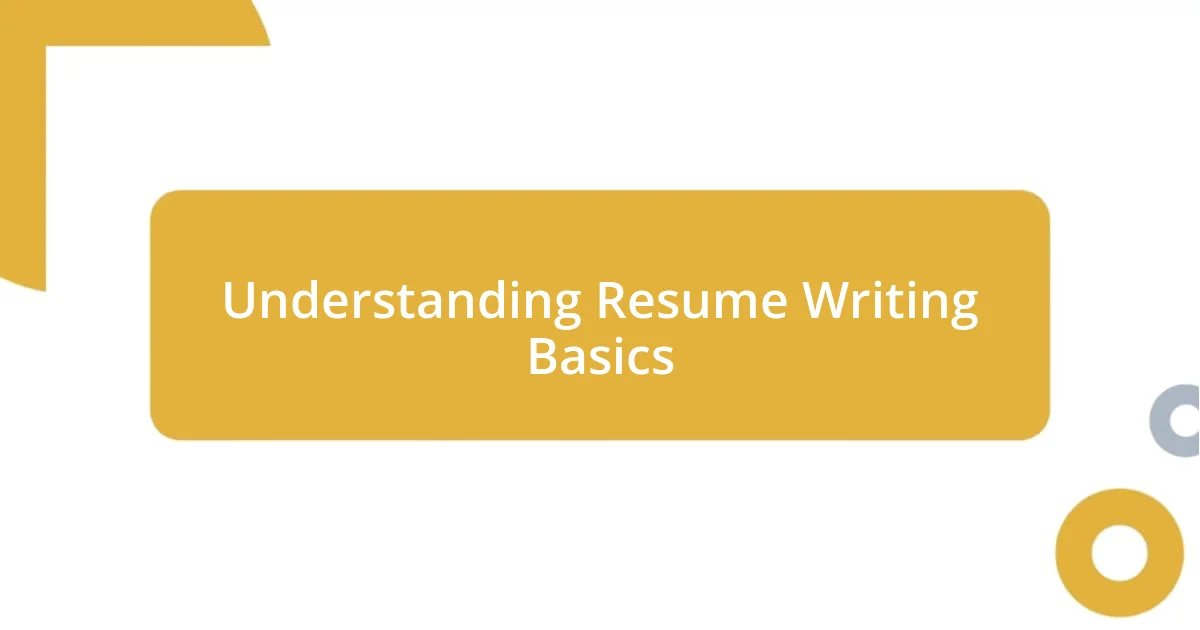
Understanding Resume Writing Basics
Getting the basics of resume writing right is crucial. I still remember my first workshop vividly; it was like peeling back layers I didn’t even realize existed. The instructor emphasized the importance of tailoring your resume to each job application. Does that sound tedious? It might seem so at first, but it quickly becomes second nature and significantly improves your chances of landing an interview.
One of the key takeaways for me was understanding the structure of a resume. I used to think it was just a list of jobs and education, but it’s so much more. Learning about headings, bullet points, and the correct order of sections helped me present my information in a clearer manner. Have you ever felt overwhelmed by the options? I know I did, but focusing on clarity and relevance made the process much more manageable.
Another essential element I learned is the significance of action verbs. When I started using words like “achieved,” “created,” and “led,” I noticed a shift in how I felt about my accomplishments. It suddenly felt more empowering to articulate my experiences. Isn’t it amazing how the right words can transform the perception of our skills? Emphasizing results rather than just responsibilities can turn a mundane list into a compelling narrative about your professional journey.
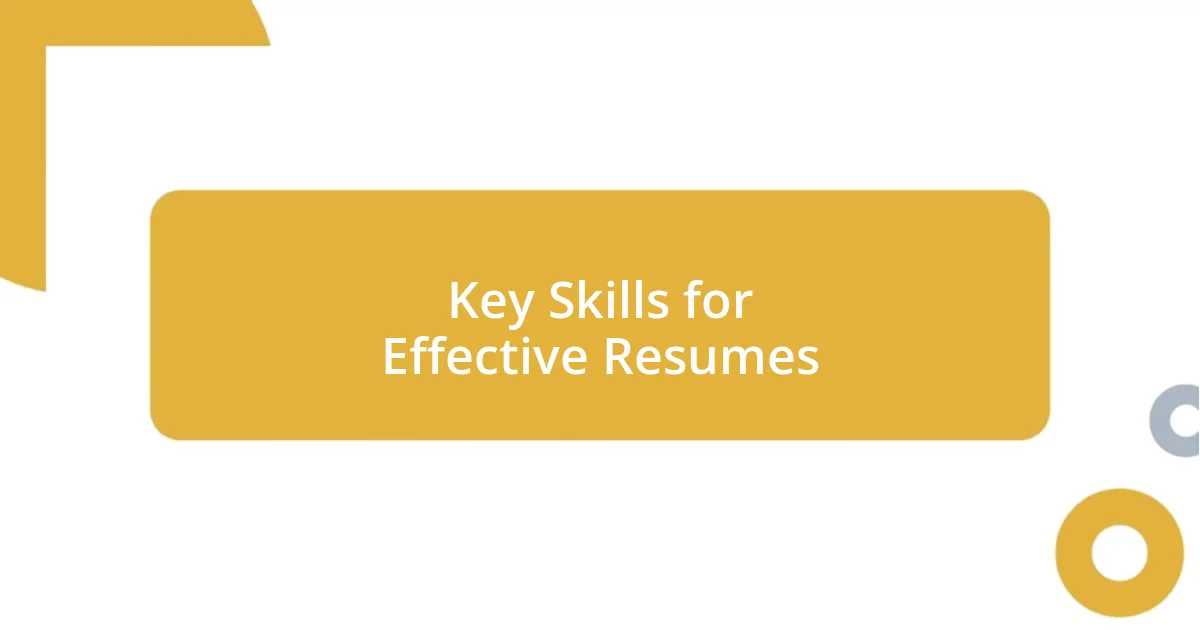
Key Skills for Effective Resumes
Developing key skills for an effective resume goes far beyond just listing your experiences. For me, one transformative insight was understanding the importance of clarity in communication. When I revamped my resume, I organized my sections logically and used concise bullet points to highlight my achievements. It felt liberating to present my qualifications clearly, allowing my personality and fit for the role to shine through.
Here are the key skills I believe are essential for crafting powerful resumes:
- Tailoring Content: Customize each resume to align with the specific job description.
- Clarity and Brevity: Use simple language and avoid jargon, focusing on essential points.
- Action Verbs: Incorporate strong action words to convey accomplishments effectively.
- Quantifiable Achievements: Whenever possible, provide numbers to back up your claims.
- Professional Formatting: Use a clean, easy-to-read layout that highlights key information.
- Consistent Tone: Ensure your resume’s tone reflects your personality while remaining professional.
- Proofreading for Errors: Take the extra time to review for typos and grammatical mistakes; even small errors can leave a big impression.
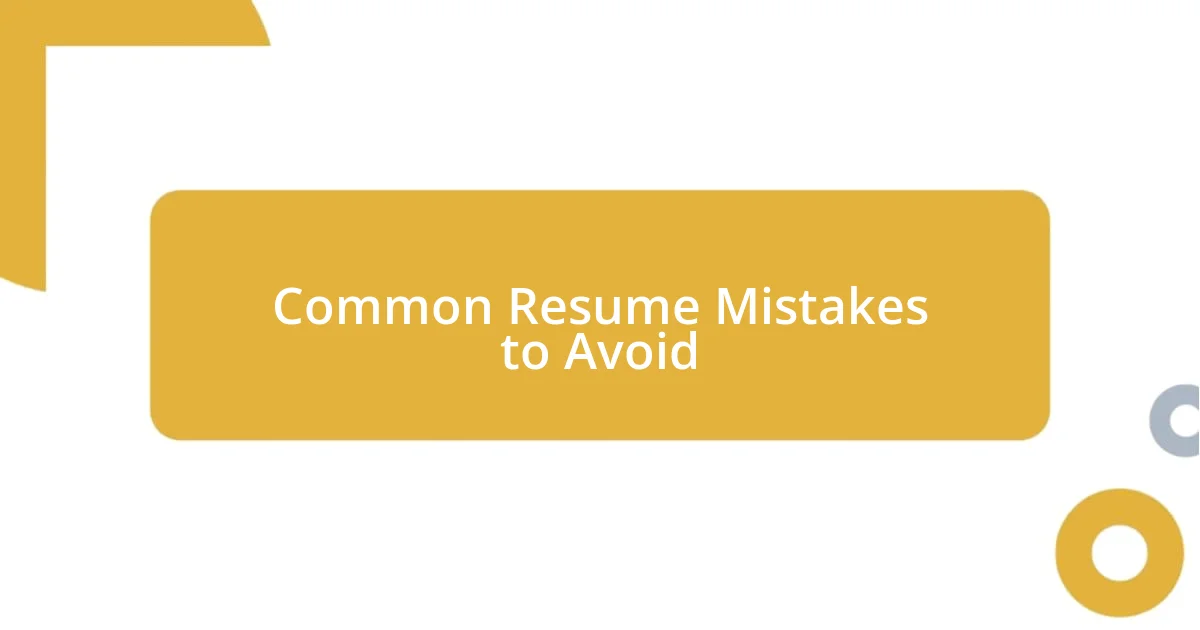
Common Resume Mistakes to Avoid
One common mistake I often see is the lack of customization. When I first sent out generic resumes, I couldn’t understand why I wasn’t getting responses. It wasn’t until I tailored my resume to each specific role, highlighting relevant skills and experiences, that I began to see results. Remember, a tailored resume shows that you’ve put in the effort and genuinely care about the position.
Another issue I’ve encountered is the overuse of clichés. Terms like “hardworking” or “team player” sound great but lack originality. I once had a mentor who encouraged me to replace these buzzwords with specific examples of my teamwork, like successfully collaborating on a major project. This not only made my resume stand out but also provided tangible proof of my abilities.
Lastly, I’ve learned that including irrelevant information can dilute the impact of my resume. Initially, I was tempted to fill my resume with every job I held. After some reflection and feedback from workshops, I realized I needed to focus on experiences that directly aligned with my career goals. It’s about quality, not quantity; showcasing only what truly matters can make a significant difference in making a strong first impression.
| Common Mistakes | Impact |
|---|---|
| Lack of customization | Increased chances of being overlooked for roles |
| Overuse of clichés | Resumes blend in, failing to capture attention |
| Including irrelevant information | Dilutes the message, making key skills less noticeable |
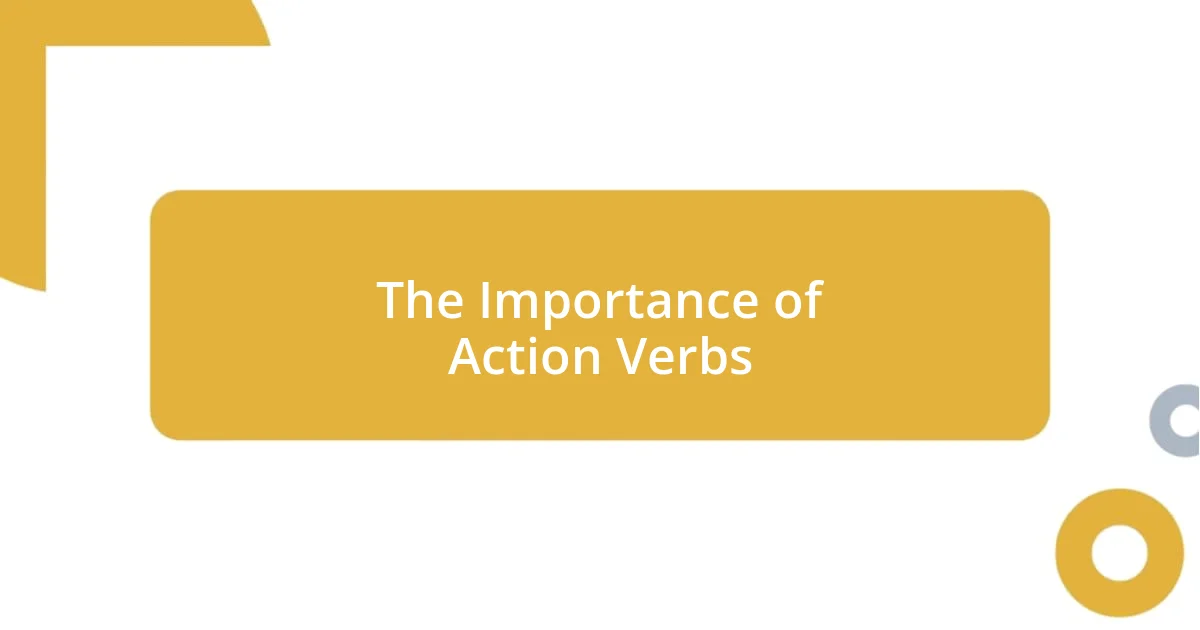
The Importance of Action Verbs
When I first started honing my resume, I underestimated the power of action verbs. I remember sitting at my desk and typing out my job responsibilities, feeling somewhat uninspired. It wasn’t until I shifted my focus to using vivid action verbs like “led,” “developed,” and “achieved” that my experiences truly came to life. This simple change transformed my duties into impactful accomplishments, giving hiring managers a clearer picture of what I could bring to their team.
Using action verbs adds a dynamic quality to your resume. They communicate not just what you did but how you did it, painting a more memorable picture in the reader’s mind. Have you ever considered how words like “implemented” can convey initiative and leadership? That’s the difference between just stating a task and showcasing an achievement. It’s almost magical how these words can encapsulate your efforts and results into a few powerful syllables.
In my own experience, action verbs taught me to think critically about my contributions. Instead of passively listing my roles, I began to reflect on my impact in each position. For example, transitioning from “assisted with project planning” to “spearheaded project planning,” not only amplified my role but also instilled a sense of pride in my work. It made me realize that I had skills worth highlighting, and this mindset shift helped reshape my entire approach to career development. So, what action verbs are you using to tell your story?
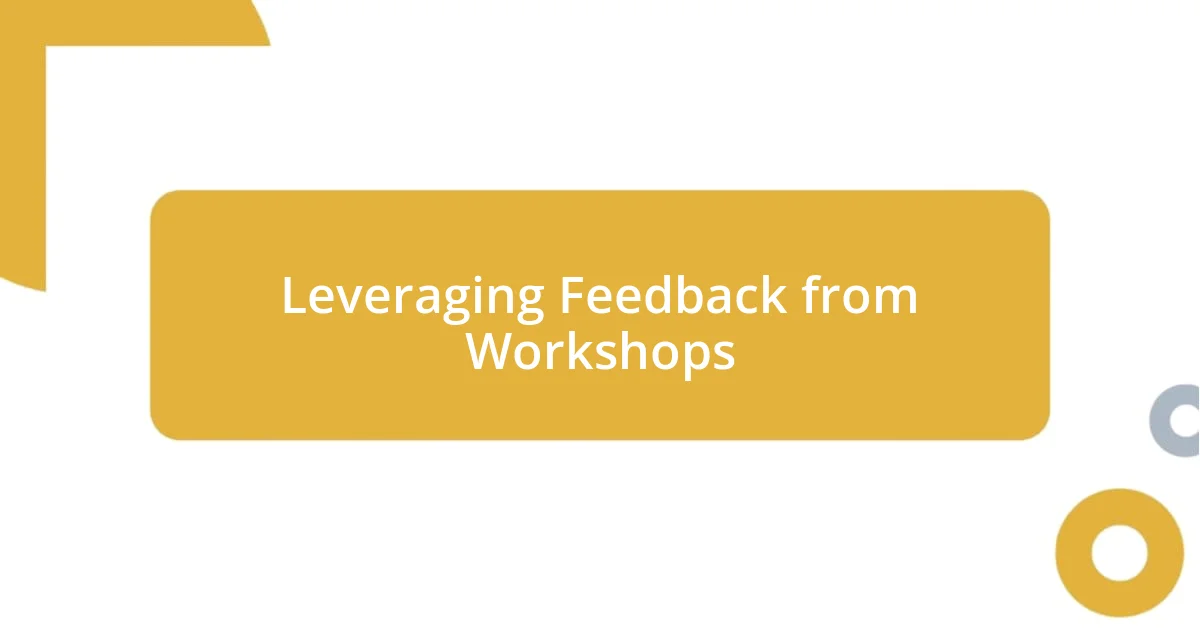
Leveraging Feedback from Workshops
Receiving feedback during resume writing workshops has been a game-changer for me. I recall one session where an instructor pointed out that my summary lacked clarity. At first, I felt defensive, but then I realized he was right. Taking that constructive criticism to heart, I rewrote my summary to better articulate my career goals. It made all the difference, helping me present a more focused narrative about my professional journey.
Another profound insight I gleaned was the importance of peer feedback. During a workshop, I exchanged resumes with a fellow participant. Her fresh perspective highlighted several inconsistencies I had overlooked. It reminded me of the value of collaboration; I found that sometimes we’re too close to our own work to see what others can easily spot. This experience opened my eyes to how much we can learn from our peers, encouraging me to actively seek opinions and perspectives in the future.
What stands out for me is how feedback acts as a mirror, reflecting areas for improvement that I might not recognize on my own. In one workshop, I shared my resume draft with the group, and the range of suggestions enriched my final product. It was liberating to accept that others’ insights could enhance my narrative. I often question, how many missed opportunities might stem from ignoring valuable feedback? The answer is, likely many! Embracing feedback has become a key part of my resume writing strategy, and I wholeheartedly recommend it to anyone ready to refine their approach.
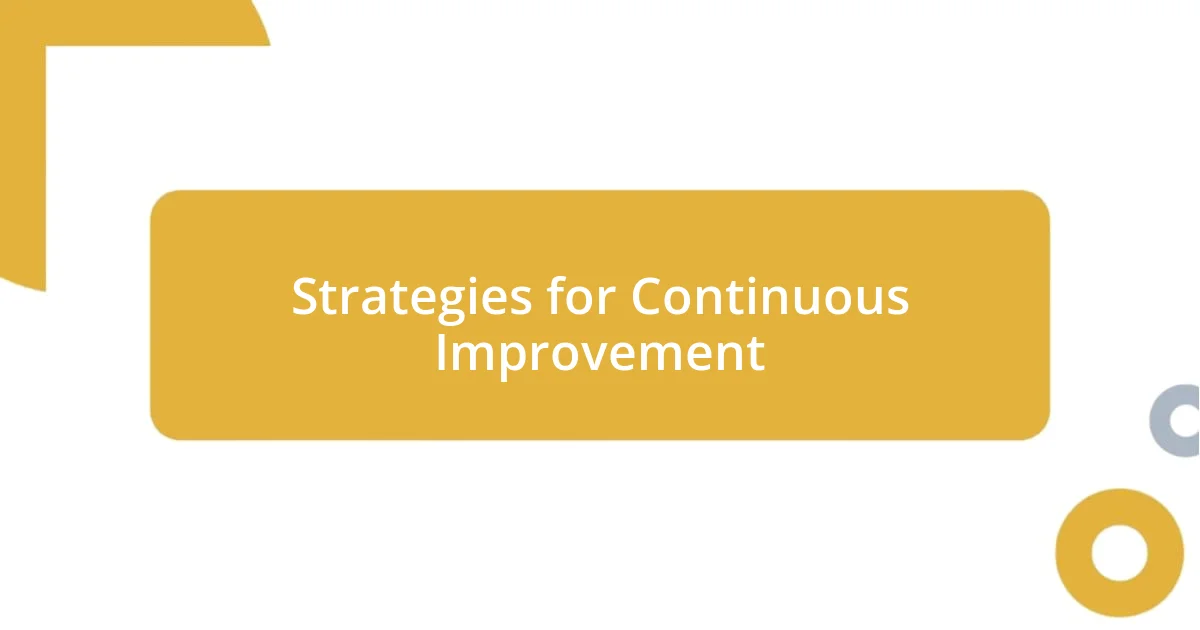
Strategies for Continuous Improvement
Continually refining my resume has taught me the importance of setting specific goals for improvement. After attending a workshop, I made it a habit to review one section of my resume each month. This focused approach turned the daunting task of overhaul into manageable bits. I found incredible satisfaction in celebrating two accomplishments: not only did I enhance my resume steadily, but I also felt a renewed sense of purpose in my professional identity. Have you ever challenged yourself to make incremental changes? It can be eye-opening to see how little adjustments build a powerful narrative over time.
Another strategy that I found invaluable is keeping a running list of achievements. I often forget the small wins that accumulate over time, and creating a document where I jot down successful projects and positive feedback has become my go-to tool. I remember one time I received an email praising my quick problem-solving skills during a critical team project. That moment, now chronicled, serves as a reminder of my capabilities. How often do you capture your accomplishments? Regularly reflecting on our achievements, big or small, can transform our self-perception and provide excellent material for our resumes.
Lastly, I discovered the importance of staying informed about industry trends. As I began diving into current job postings and reading articles relevant to my field, I uncovered specific keywords and phrases that employers are looking for. I was amazed at how tailoring my resume to mirror these trends elevated its impact. Have you ever noticed how a job listing resonates with your own experiences? Connecting your qualifications with industry language not only strengthens your resume but also signals to hiring managers that you understand the market. It’s a rewarding exercise that can sharpen your competitive edge, reminding me how crucial it is to adapt and innovate in our professional journeys.
